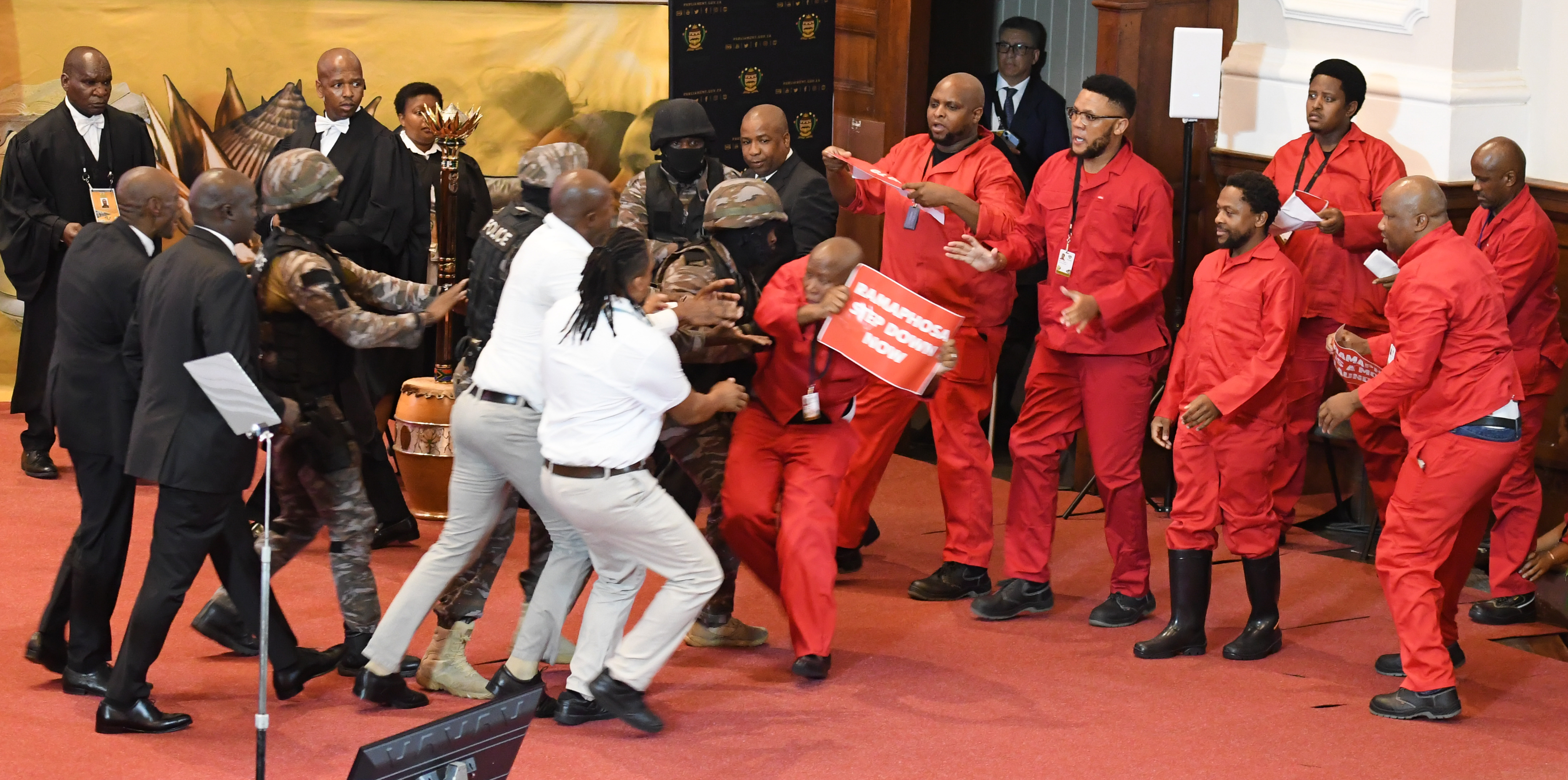The finding by Judge Derek Wille in the Western High Court on Monday that the EFF doesn’t have the right to disrupt parliamentary proceedings comes at a significant moment as the role of SA’s seventh Parliament with a coalescing government of national unity solidifies.
So far, former president Jacob Zuma’s newly formed uMkhonto Wesizwe (MK) party and a few others in the coalition of the vengeful are refusing to play ball.
In 2021, Zuma was convicted of “unprecedented” contempt and sentenced to 15 months in jail. He served only a fraction of it after an attempted insurrection in KZN and Gauteng in July of that year.
Judge Sisi Khampepe said then that the majority of the court felt about Zuma’s contempt that “when the constitutional safeguards are undermined so egregiously, it requires swift and effective action… Never before has the Constitutional Court been subject to the kinds of attack launched by Mr Zuma.”
Peak Zupta years
Back in 2015, during Zuma’s peak power as president, the EFF disrupted the State of the Nation Address, chanting “Pay back the money” with regard to state expenditure on Zuma’s private home at Nkandla. EFF MPs scuffled with parliamentary security when they were forced out of the National Assembly.
The same happened in 2017 when Zuma’s star fell into a quagmire of State Capture allegations.
These incidents, the EFF’s 2015 and 2017 ejections, have washed ashore several years after the fact.
In 2015, the State Security Agency (SSA) and the then minister of state security, David Mahlobo, scrambled cellphone communications in Parliament as an alleged “counter-threat measure” before Zuma’s scheduled address. The EFF was removed from the chamber.
Mahlobo later blamed the move on “an operational error” by an official.
Free speech not absolute
On Monday, Judge Wille said, “In our new democracy, parliamentary members enjoy freedom of speech, but this right cannot be absolute. It is governed and regulated by parliamentary rules and regulations.”
The foundations of South Africa’s constitutional dispensation placed an obligation on all “to respect and adhere to constitutional supremacy and the rule of law,” he said.
The EFF’s leader, Julius Malema, and 23 of the party’s MPs were the applicants, with the Speaker of the National Assembly, the chair of the National Council of Provinces and the minister of police as respondents.
The EFF had been accused of “wilfully, violently and with premeditation unlawfully [disrupting] certain presidential proceedings”, on two occasions after which the Speaker, Baleka Mbete at the time, requested protection services to remove EFF MPs.
As is its habit, the EFF turned to the courts, where it sought an order that it had been unlawful to order the ejection of its parliamentary members. On top of that, the party claimed compensatory “constitutional damages”.
The EFF alleged party members had been “unlawfully and violently assaulted during and after” the process of their removal from Parliament. The express intention of the EFF disruptions had been to humiliate Zuma and prevent him from addressing the nation.
Judge Wille said, “In these circumstances, it would not be legally permissible for the applicants [EFF] to assert their rights to some species of constitutional protection to excuse their conduct.”
Applying the rule of law
Judge Wille explained that while the opposed application concerned “some complex legal issues”, it essentially boiled down to “applying the rule of law in our new constitutional democracy”.
While the EFF had placed more emphasis on the “constitutional character” of their application, their complaint was not the removal itself, but “the gratuitous violence” that followed.
However, Judge Wille found “the disguised and chameleonic approach of dressing up the true cause of action was simply an attempt to circumvent several statutory hurdles, and this application was not infused with any true constitutional ingredients”.
To enable parliamentary members to carry out their constitutional functions effectively, specific targeted legislation was enacted to provide for further privileges and immunities for parliamentary members to protect the authority, independence and dignity of the legislatures and their members.
Following this targeted legislation, a person who causes or participates in a disturbance in the chamber during a parliamentary session may be arrested and removed from the chamber, Judge Wille said.
Parliament had sought punitive costs against the EFF, stating that the party’s application was “fatally flawed”.
The EFF had made “several unfounded serious claims and allegations” and the party’s application had been “unjustified, vexatious, impermissibly delayed and moot”, the respondents said.
The high court ordered the EFF to pay the costs of two counsel. DM





